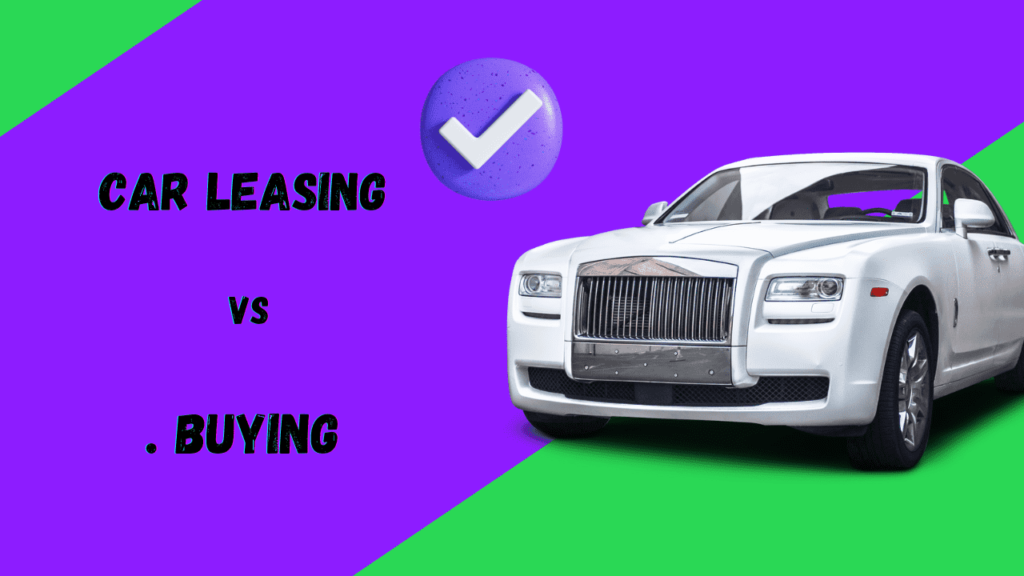
Deciding between leasing or buying a car is a significant financial decision that impacts your budget, lifestyle, and long-term plans. Each option has its pros and cons, and the best choice depends on your personal circumstances. Here’s a comprehensive guide to help you decide whether leasing or buying a car is right for you.
Understanding Car Leasing
What is Car Leasing? Leasing a car is essentially a long-term rental agreement. You pay a monthly fee to drive the car for a specified period, typically 2-4 years. At the end of the lease term, you return the car to the dealership, with the option to lease a new one.
Pros of Leasing a Car:
- Lower Monthly Payments: Monthly lease payments are generally lower than loan payments for buying a car because you’re only paying for the car’s depreciation during the lease term, not its entire value.
- Lower Upfront Costs: Leasing often requires less money down than buying. In some cases, you might not need a down payment at all.
- Newer Models: Leasing allows you to drive a new car every few years, which means you can take advantage of the latest technology, safety features, and efficiency improvements.
- Maintenance Coverage: Most leased cars are under warranty for the duration of the lease, so you won’t have to worry about major repair costs.
- Tax Benefits: If you use the car for business purposes, you may be able to deduct lease payments from your taxes.
Cons of Leasing a Car:
- No Ownership: At the end of the lease, you don’t own the car. You’re essentially renting it, so you’re building no equity.
- Mileage Limits: Leases come with mileage limits, typically 10,000 to 15,000 miles per year. Exceeding these limits can result in costly penalties.
- Wear and Tear: You’re responsible for keeping the car in good condition. Excessive wear and tear can lead to additional charges.
- Long-Term Costs: Leasing can be more expensive in the long run if you continue leasing new cars instead of buying one and keeping it for several years.
- Less Flexibility: Breaking a lease early can result in significant penalties.
Understanding Car Buying
What is Car Buying? Buying a car means you finance the purchase through a loan or pay cash to own the vehicle outright. You build equity in the car and have the flexibility to keep, sell, or trade it whenever you choose.
Pros of Buying a Car:
- Ownership: You own the car and can keep it as long as you want. There are no restrictions on mileage or customization.
- No Monthly Payments: Once your loan is paid off, you own the car free and clear, eliminating monthly payments.
- Equity: You build equity in the car, which you can use as a trade-in or sell to recoup some of your investment.
- No Mileage Limits: Drive as much as you want without worrying about mileage penalties.
- More Control: You have complete control over the car, including how you maintain and modify it.
Cons of Buying a Car:
- Higher Monthly Payments: Loan payments are typically higher than lease payments because you’re financing the car’s full value.
- Depreciation: Cars depreciate quickly, and the resale value may be much lower than the purchase price.
- Maintenance Costs: After the warranty expires, you’re responsible for all maintenance and repair costs, which can be expensive.
- Upfront Costs: Buying usually requires a higher down payment and can have higher taxes and registration fees.
- Long-Term Commitment: Selling or trading in a car can be a hassle, especially if you owe more than the car’s value.
Factors to Consider
1. Financial Situation:
- If you have a stable income and can afford higher monthly payments, buying might be better. Leasing could be more suitable if you prefer lower payments and less upfront cost.
2. Driving Habits:
- If you drive a lot, buying is typically better due to mileage limits on leases. Leasing is ideal for those with predictable, lower annual mileage.
3. Long-Term Plans:
- Leasing is great for those who like driving new cars every few years. Buying is better if you plan to keep the car for a long time.
4. Personal Preference:
- Consider whether you value ownership and building equity or if you prefer the convenience and lower payments of leasing.
Conclusion
Deciding whether to lease or buy a car depends on your individual needs and circumstances. Leasing offers lower monthly payments, the opportunity to drive new cars frequently, and fewer maintenance worries. However, it comes with mileage limits, no ownership, and potential penalties. Buying a car provides ownership, no mileage restrictions, and long-term savings but involves higher monthly payments and potential depreciation losses.
Evaluate your financial situation, driving habits, and long-term plans carefully to make the best decision for you. Whatever you choose, understanding the pros and cons of each option will help you drive away satisfied.